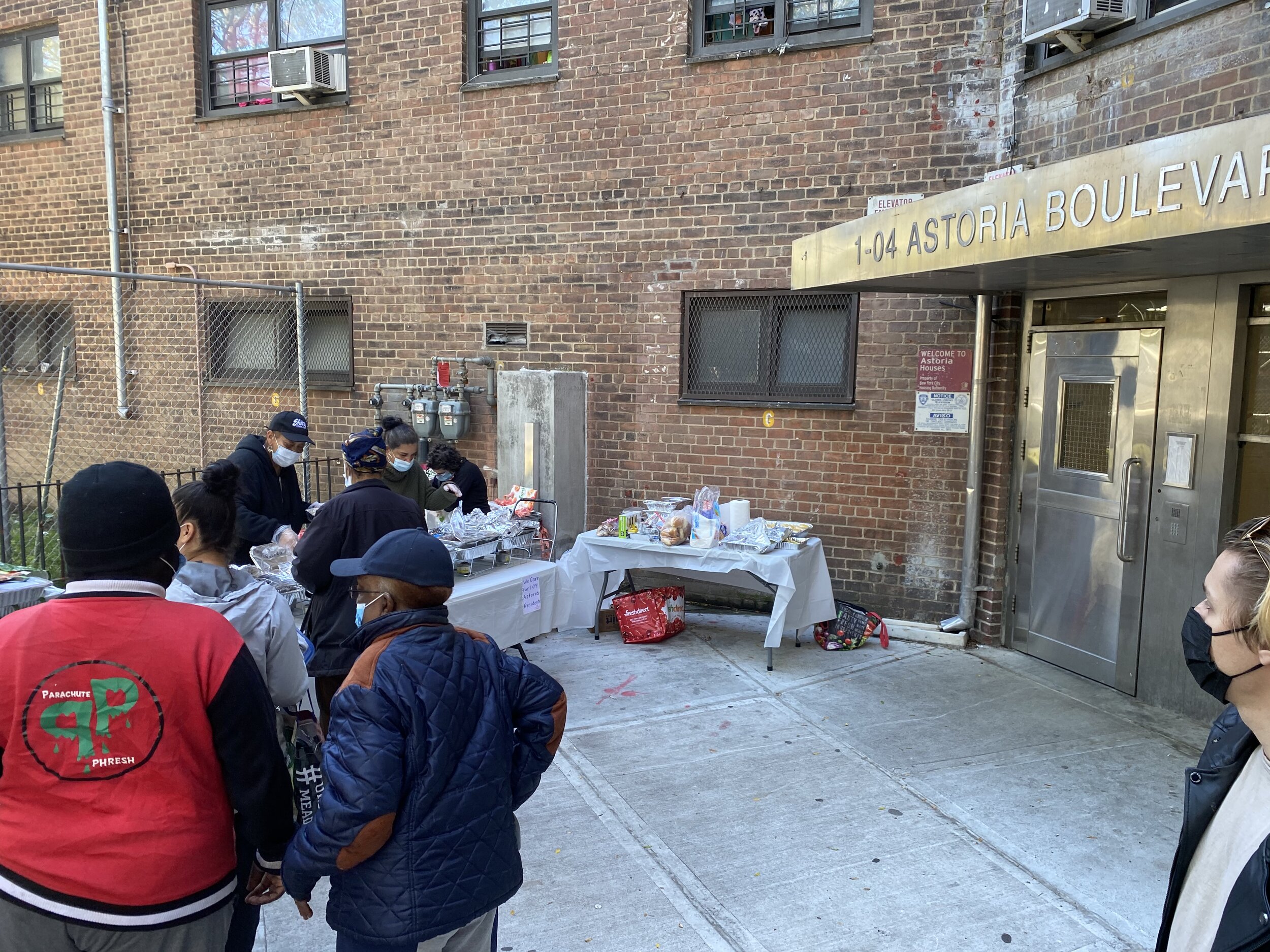Astoria Houses tenants weigh rent strike after three weeks without gas
/City Council candidate Evie Hantzopoulos (left) and other volunteers have provided trays of food to tenants at the Astoria Houses who have not had gas for more than three weeks. Photos by Brenna Holland
By Brenna Holland
For 25 days, residents of one building in Astoria Houses have been unable to cook a hot meal.
Their building has a gas outage, and residents of the 48 affected apartments say they have received very little information from the New York City Housing Authority, despite their appeals for a repair timeline.
Instead, they’ve received one electric hot plate per household.
“The only thing you can cook on that hot plate is coffee and water,” said Rebecca Ford, an 87-year-old who has lived in Astoria Houses with her grandson for five years.
Over the past three weeks, Ford has had to dip into her rent money to purchase meals she would have normally cooked at home.
Residents line up for food outside their Astoria Houses building.
The 400,000 New Yorkers who live in public housing are no stranger to extended gas outages. This past year, there have been outages at NYCHA’s 303 Vernon, Marlboro Houses and Red Hook Houses in Brooklyn. In the case of the Marlboro outage, which began nearly a year ago, residents’ stoves were unusable for weeks and still cold on Thanksgiving night.
Residents of the Astoria Houses fear this outage will last into this year’s holiday season.
“It’s terrible because the holidays are coming up. I go to my daughter’s for Thanksgiving; but for Christmas, I usually have my family here and I don’t think my stove will be working by then. Do you know how long it took them to fix my bathroom? Over a year,” Ford said.
Ford said the broken stove is the most recent addition to a long list of issues with her apartment. She said she has frequently reminded management about peeling paint, holes in the interior and exterior walls, unsanitary hallways and broken elevators.
Local leaders say NYCHA needs to spend money to correct the gas outage immediately, especially as multi-billion dollar proposals in adjacent communities illustrate the city’s vast socioeconomic disparities.
“Our city was willing to build a deck over Sunnyside Yards for billions of dollars. Why is the money always found for things like that and not for people who deserve a decent place to live?” said Evie Hantzopoulos, a Queens Community Board 1 member and a candidate for City Council.
Hantzopoulos, a member of CB1’s Housing Committee, has begun organizing a weekly “guerrilla catering” event to make sure residents have meals.
A volunteer serves food for a resident of the affected building.
Hantzopoulos put out a call on Facebook looking for volunteers interested in cooking for the residents of the Astoria Houses. This past Saturday, the group of volunteers set up 30 large trays of home-cooked food in front of the building.
Many residents brought plastic containers down from their apartments and stocked up on meals for the week. Able-bodied residents packaged and delivered meals for their senior and immunocompromised neighbors who couldn’t visit the cookout themselves.
Residents also contacted the Justice For All Coalition, a group of fair housing organizers, a week into the gas outage to help advocate for repairs. The activists told tenants about their rights and discussed a potential rent strike, Hantzopoulos said.
JFAC organizers said NYCHA informed them that the company contracted to fix the outage has been delayed by another project at the Ravenswood Houses.
A NYCHA spokesperson said the agency shut down the main gas valve for the building because of a serious leak.
“The gas service restoration process involves multiple partners and steps, and we are currently working with an outside vendor to expedite this process,” the spokesperson said. “We are regularly providing residents with updates on the progress made towards service restoration.”
While they await repairs, tenants have a right to withhold rent because their “warranty of habitability” — the right to live in a building that is in good repair — has been breached, said JFAC Executive Committee member Kristen Hackett.
It is the responsibility of the landlord — in this case, NYCHA — to maintain the conditions of the building, Hackett said. When this responsibility is not upheld, residents have a legal right to withhold rent in some cases.
“There are conditions to this,” Hackett said. “You have to be a resident in good standing. You have to have paid rent on time most months and, because NYCHA ties housing to police interaction, you have to make sure you don’t have a negative history with police.”
JFAC is also organizing a collective action across multiple NYCHA buildings, including nearly 100 residents from the nearby Queensbridge and Ravenswood Houses, as well as the Jefferson Houses in Manhattan and South Beach Houses in Staten Island.
Residents are submitting letters of complaint, outlining general repairs needed in their buildings and asking NYCHA to appear on a specific date and time to discuss a plan.
If NYCHA fails to appear, residents will submit a second letter of grievance. If the residents’ concerns are not adequately addressed, these letters can become the basis for a collective action that may take the form of suing NYCHA for negligence, Hackett said.
For Ford, the 87-year-old grandmother, a rent strike or any form of collective bargaining alongside her neighbors may be the next step to affect change.
“I’m not afraid of talking about this. Something has to be done,” Ford said. “We’re living like animals here.”






